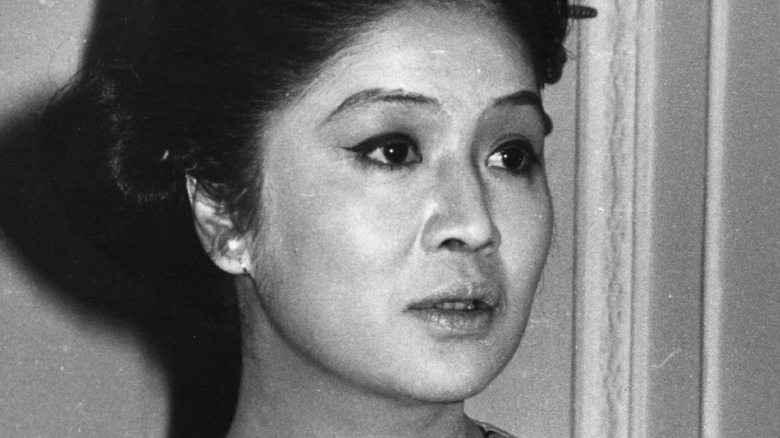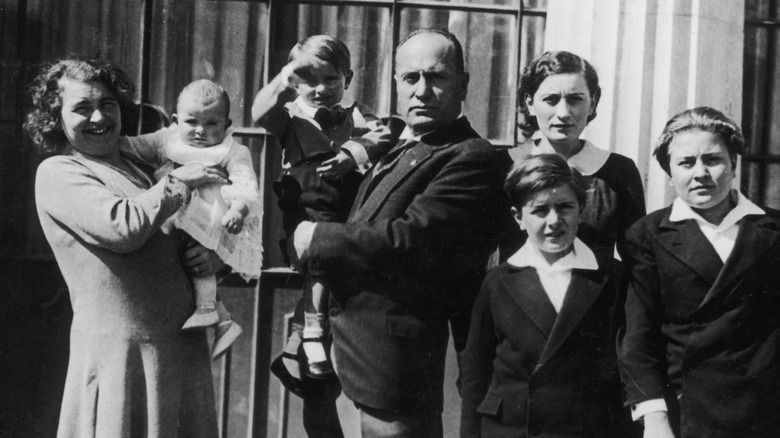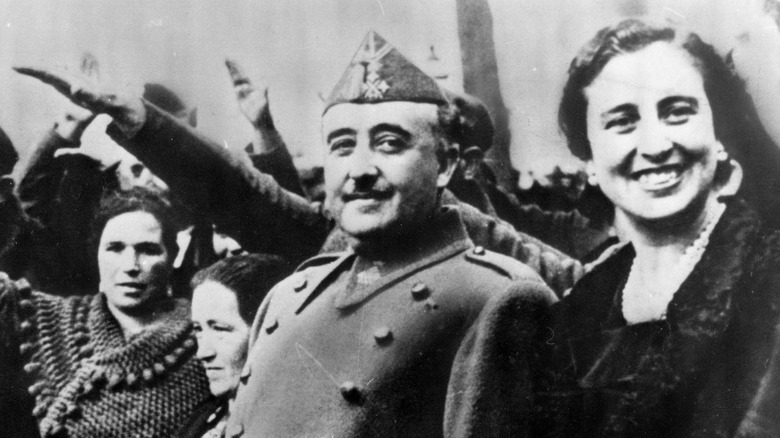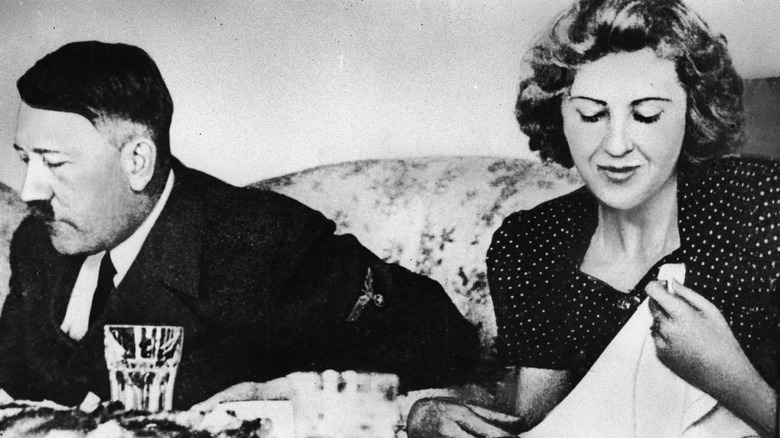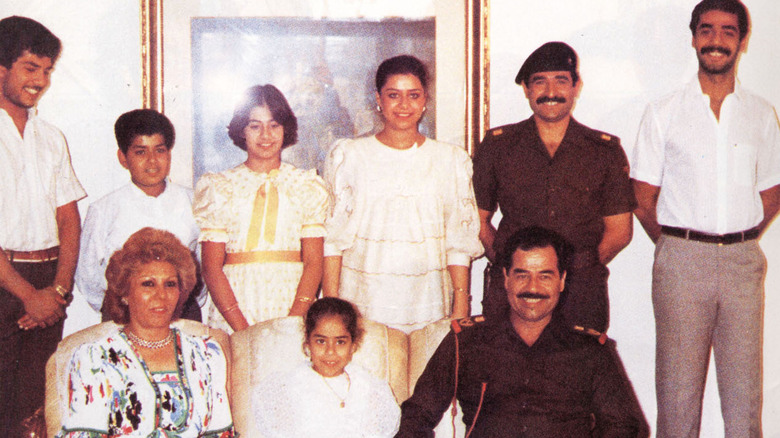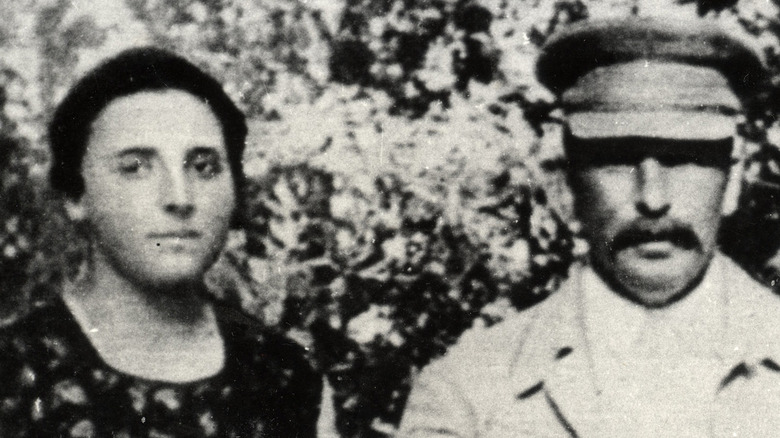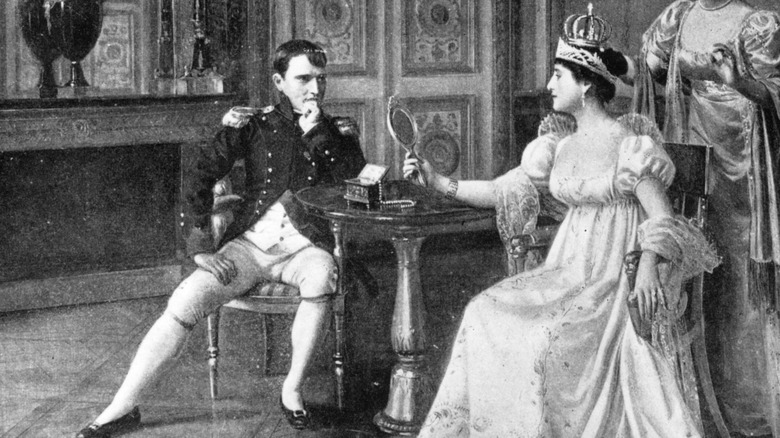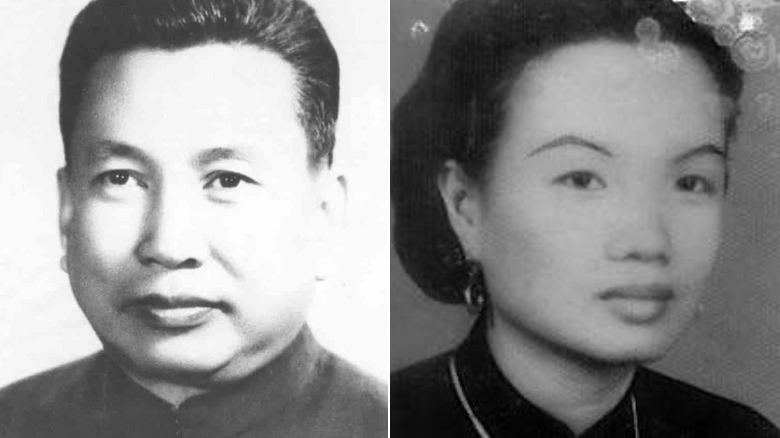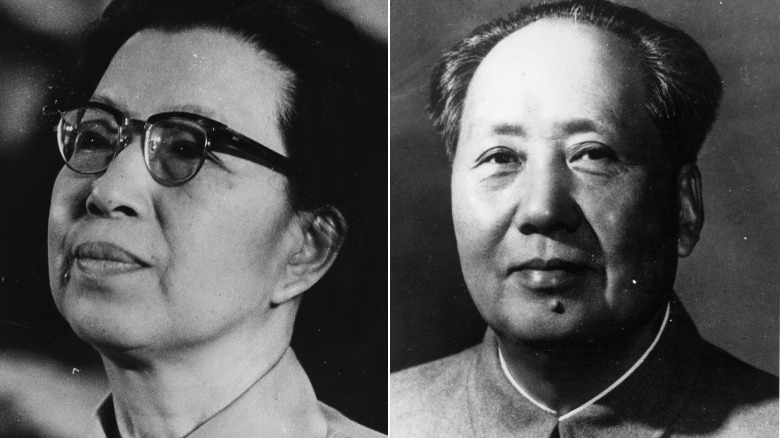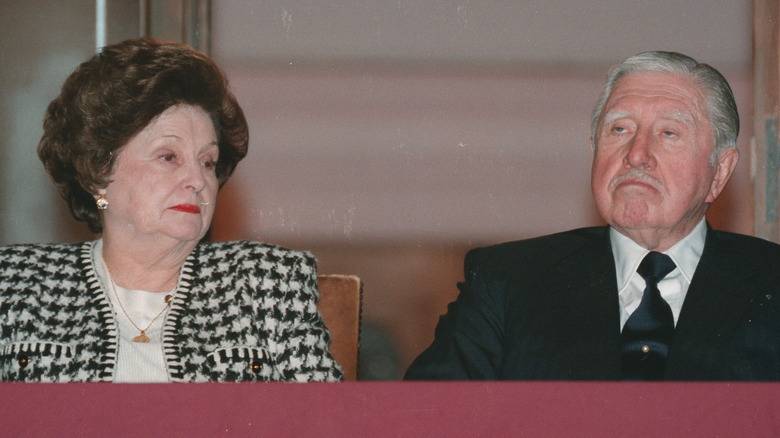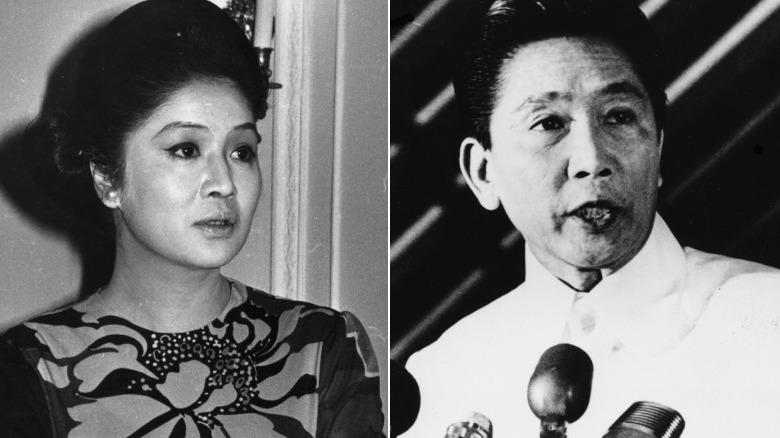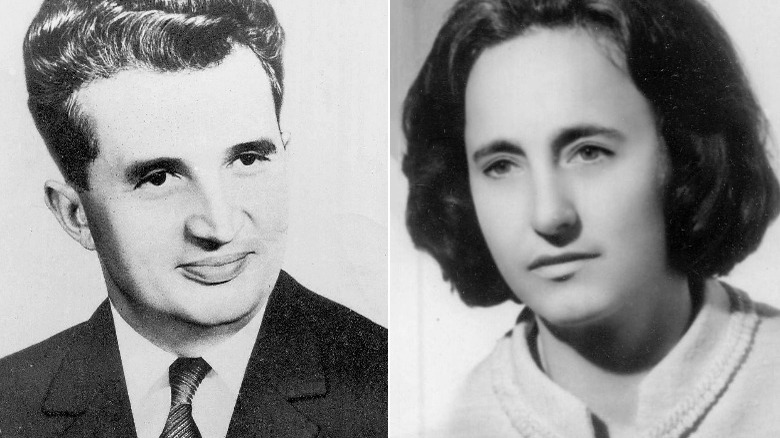What The Wives Of These Famous Dictators Were Really Like
While dictators committed genocides and flooded their countries with propaganda, their wives were often at their sides, typically looking glamorous and jewel-bedecked. As stated by the New York Times, despots will often commit atrocities while having their fashionable and charming wives shop for designer shoes and attend charity events. As discussed in the Guardian, it is debated how complicit the wives of dictators are, particularly since some dictators specifically select beautiful brides to soften their image and distract from their crimes, and sometimes those women have no choice.
To maintain their images, the actual lives, relationships, and motivations of these women living at the heart of authoritarian regimes are often kept secret. Some, like Eva Braun, seem to have genuinely loved some of the cruelest men in history. Others, like Elena Ceaușescu and Imelda Marcos, seemed to desperately want the prestige and opulent lifestyle provided by their despot husbands. Their actual opinions on the dictatorships that their husbands ruled can be difficult to know for certain. Some, like Nadezhda Alliluyeva, seem to have actively disagreed with their husbands but had little power to stop them. Others, like Jiang Qing and Carmen Polo, wielded tremendous power of their own within the regimes and were almost as feared as their husbands.
Rachele Mussolini
Near her birthplace in Northern Italy, an elderly widow named Rachele worked in her restaurant and hotel, "La Caminata." Until her death at the age of 89 in 1979, she supported herself by caring for her guests, supplemented with a pension that she had fought for years to receive – one she felt was owed to a former Prime Minister's wife. The modest and reserved woman's husband had been infamous fascist dictator Benito Mussolini.
Rachele Mussolini might have been Il Duce's wife, but as noted by The New York Times, she had always been a hard worker. Her parents were peasants. She met the future dictator as a teenager, when she worked at his parents' inn as a kitchen maid. After Benito Mussolini seized power, Rachele did her best to stay out of the public eye, avoiding attending events with her husband. She continued to be a homemaker, cleaning and doing laundry, and cooking for her husband who returned every day at lunchtime.
In 1945, Benito Mussolini was executed along with his longtime mistress, Claretta Petacci, but Rachele was allowed to continue living in Italy. Rachele never disavowed her husband or his fascist regime, though she is quoted in the Washington Post as regretting that he changed careers from newspaper editor to dictator, because politics were too unpredictable.
Carmen Polo
General and dictator Francisco Franco's wife, Carmen Polo, was a figurehead for Franco's supporters after his death, frequently being greeted with fascist salutes at her annual public appearance to mourn at her husband's burial site. During his reign, she was beloved by the press but hated by the majority of the people.
Polo was educated by nuns and was an extremely devout Catholic. It is believed that she was responsible for the oppressive censorship that was forced on Spain during Franco's regime, as she encouraged her husband to make her moral views law. All forms of arts and media were forced to remove all references to sex and eroticism.
As noted in Britannica, the public considered Polo a hypocrite – spending vast sums of money on her own appearance while encouraging her husband to force Spain to follow her strict religious rules. She was widely known for her sense of style. As described by The Washington Post, in public, Polo wore a high hair comb and traditional black lace veil, designer clothes, expensive jewelry, and a smile. The public nicknamed her "Dona Necklaces," and she was seen as vain, arrogant, and proud.
Eva Braun
Young Eva Braun liked to go out and have fun. She was interested in music, travel, and fashion. Her favorite author was Oscar Wilde – an author whose books would be banned under the regime of her future husband, Adolf Hitler. Eva herself was never in the Nazi party, and didn't recognize the 40-year-old Hitler when they first met. She was just 17. She would become obsessed with him.
Eva Braun was Hitler's girlfriend for over a decade before she became his wife – the day before both of their deaths. As explained by historian and Eva Braun biographer Heike Görtemaker (via the Daily Beast) the two destroyed all of their letters before they died by suicide in the Reichschancellery bunker. Occasionally, she was allowed to throw small parties for his inner circle and enjoy the spotlight as Hitler's girlfriend. Eva would wear expensive clothes and jewelry, and worked very hard to stay thin. She ate very little, but reportedly drank massive amounts of champagne.
The fascist dictator kept her a complete secret from the world, having her hide upstairs when people came to see him. As noted by NPR, she wrote in her diary often about how much she missed him. And she deliberately returned to Berlin to die with Hitler. Even inside the bunker, she continued to throw parties.
Sajida and Samira Hussein
Iraqi dictator Saddam Hussein's first wife was a fashionista named Sajida Khayrallah (pictured, sitting). They were first cousins, and their marriage was arranged when the two were between 4 and 7 years old. As noted by the Washington Post, Sajida was very image-conscious and interested in Western aesthetics. She bought designer clothes from Paris and dyed her hair blonde.
Despite the image of a perfect family that the couple tried to promote with many family photos being sent to the press, Saddam Husein was having affairs, and couldn't keep them out of the papers. Sajida was extremely jealous, and for good reason. One of Saddam's mistresses was Samira Shahbandar, who would become his second wife – before he had even divorced Sajida.
Samira was another well-dressed blonde. As noted in an interview with Marie Colvin of the Sunday Times, Saddam Hussein was so obsessed with Samira that he kidnapped her husband and persuaded her to marry him instead. "He was a good husband...” Samira said. "I did know that if I said no to Saddam, he might kill me.” Despite this, Samira was reportedly distraught when she had to leave him behind during the Iraq War - fleeing the country with a suitcase containing $5 million in cash and 10kg of gold. It is believed that she was unaware of the conditions faced by most people under her husband's regime. Sajida left the country as well, reportedly also with money and gold.
Nadezhda Alliluyeva
Nadezhda Alliluyeva's parents were Russian workers and revolutionaries. In letters written before her marriage to Joseph Stalin (reprinted in "Kremlin Wives"), Alliluyeva describes herself as often depressed. Food was expensive and hard to come by, and it was often necessary to wait in long lines to purchase anything. At 17, she described herself as an anarchist. She told a friend, "The trouble is I've become rude and irritable, but I'll probably grow out of it."
As a teenager, Alliluyeva traveled to Moscow with Stalin as his personal assistant. When she was 16, they were married. He was 39. Some sources, including Alliluyeva's younger sister, have stated that he assaulted her, and only asked to marry her when her father threatened him. Alliluyeva worked as a member of Lenin's secretarial staff, even after she became a mother. She had little interest in being a housewife but was a diligent worker, described as modest, religious, and looking older than she was.
Tensions between her and Stalin grew, and Alliluyeva suffered frequent panic attacks. The couple argued frequently, and at one point she attempted to run away, taking their children with her. As noted by the New York Times, it is believed that Alliluyeva argued against purges within the party and confronted Stalin about the terrible famine that was ravaging the Soviet Union as a result of his order to collectivize the nation's agriculture, only to be met with abuse. At 31, Nadezhda Alliluyeva died, likely by suicide.
Joséphine Bonaparte
When Joséphine Tascher was three years old, her family's estate was destroyed by a hurricane, leaving the family destitute. As stated by PBS, the family planned to change their fortunes by marrying off their daughters. Joséphine grew up to be an empress because she was adept at charming men into providing for her, but first, her family arranged for her to marry a wealthy officer (per Britannica.) Joséphine was charming and charismatic but as she hadn't received a Paris education, her husband thought that she wasn't sophisticated enough. The two separated.
During the French Revolution, her husband was executed and Joséphine herself was temporarily imprisoned. But she was resourceful, and after her release, she was able to attract the attention of more wealthy and powerful men who were willing to support her and her children. One of these men was Napoleon Bonaparte. Eventually, Joséphine agreed to marry him but remained emotionally distant. She refused to join him abroad for a honeymoon or reply to his long, passionate love letters. Historians describe Joséphine as being calm, gentle, and even submissive with Napoleon, while at the same time spending frivolously and flirting with other men.
Napoleon almost divorced her because of an affair. When he tried to have servants take her things, she once again protected herself and her assets by convincing him to take her back. Although he would ultimately have the marriage annulled, Napoleon continued to pay all of her bills while she lived in Paris, throwing extravagant parties.
Khieu Ponnary
Cambodia's Khieu Ponnary was often seen as severe by those she met in social settings, because she dressed traditionally and conservatively, and wore no jewelry or makeup. Secretly, the people sometimes called her "the old virgin."
"[Khieu Ponnary] was gentle, nice, and the first woman in Cambodia to receive such a high education," Yong Moeun, a fellow revolutionary who lived with Ponnary recalled to Cambodia Daily. Ponnary married the future dictator Pol Pot, and along with her sister and her husband, formed the extreme communist movement known as the Khmer Rouge. As described by the BBC, Ponnary would come to be known as "the mother of the revolution" and "Sister Number One." She contributed her own ideology to the movement that would lead to the deaths of over a million people in Cambodia.
At 59, Ponnary disappeared from the public eye completely. Unbeknownst to the Cambodian people, she was suffering from mental illness (which the BBC characterizes as dementia) and had been taken to China for treatment. As described by the New York Times, she never recovered. It is believed that her illness began more than a decade before Pol Pot came to power, and that the resulting paranoia caused her to frequently fixate on Vietnam.
Asma al-Assad
It is believed that Syrian dictator Bashar al-Assad's choice of wife was intended to make people more sympathetic towards the regime. Asma al-Assad was an investment banker in the U.K. prior to her marriage. As noted by Reuters, she was seen as someone who would bring democratic values to Syria, and was praised for her humanitarian work. Leaked emails from inside the family depict her differently, however. She spent lavishly on expensive things for their houses and jokingly referred to herself as "the real dictator" in the family.
Asma al-Assad had a glamorous image, wearing designer clothes and shoes, and was featured in fashion magazines around the world. According to an article in the Telegraph, American Vogue tried to interview her for years. She was described as casual and cheerful, with a British accent and a strong desire to create mystery. For a while, her marriage to Bashar al-Assad was kept secret, and she enjoyed traveling with him while people wondered who she was.
Asma al-Assad stood by her husband as his regime brutally slaughtered protesters. She withdrew from the public eye but leaked emails between the couple show Bashar sending Asma flirtatious jokes about the violence, while she responds with love and support for his actions.
Jiang Qing
Mao Zedong's wife, "The Madame" Jiang Qing has been described as unrepentantly brutal and cruel, and became infamous for speaking at massive rallies, spreading propaganda, and enforcing extreme censorship in China. Her life was defined by an unrelenting ambition for power. As described by Time, she would become the most powerful woman in The People's Republic of China, ordering the destruction of art and architecture, as well as any documents relating to her own life.
Jiang Qing worked hard to keep information about her life before her marriage to Chairman Mao a secret. As stated by the New York Times, she was born into extreme poverty, and her childhood left her with a painful stomach condition. She was arrested multiple times in her early life for "radical activity," but as detailed by Britannica, she also had a secret career as an actress, working in movies under a fake name.
While Jiang Qing had a reputation for doing anything to achieve power, she was genuinely a believer in her husband's ideology. Even when she was on trial, facing the death penalty for her participation in the violent regime, she never apologized for her actions.
Lucía Hiriart
Lucía Hiriart was the iron-willed wife of dictator Augusto Pinochet, and it is widely believed that she pushed Pinochet to gain power. The general himself credited her with convincing him to go through with the coup that would put him in control of the nation. As quoted by the New York Times, Lucía Hiriart showed him their sleeping grandchildren and told him that they would become slaves if he didn't make his decision. After the coup, the army, air force, navy, and police were planning to rotate control of the country – but Hiriart convinced Pinochet to keep control of Chile for himself.
While she promoted herself as a philanthropist, Hiriart was more likely to spend money on herself and her husband than the people of Chile. She had expensive tastes and was uncompromising. At one time she had more than 20 people working for her, responsible for taking care of her every need. She had a mansion built that cost more than $14 million.
As detailed by The Guardian, Hiriart eventually faced multiple charges of embezzling associated with her charities, as well as tax evasion and misappropriation of public funds.
Imelda Marcos
When Imelda Marcos was young, she was a literal beauty queen, and known as the "rose of Tacloban." As noted by Britannica, as the wife of the famous dictator Ferdinand Marcos, she came to be known instead as the "Steel Butterfly." As described by Esquire, the family had a massive embezzlement scheme that drained around $10 billion out of the country and into their private bank accounts for the 20 years that Ferdinand Marcos was in power. Imelda would sometimes drive through slums in Manilla, tossing pesos out the window to crowds of desperate citizens.
"They went into my closets looking for skeletons, but thank God, all they found were shoes, beautiful shoes," Imelda Marcos is quoted as saying. As described by artist Pio Abad who created reproductions of Imelda Marco's massive jewelry collection, "Imelda's imagination was shaped by a western, imperial, Hollywood or Rhode Island vision of glamour and success."
Imelda Marcos liked to travel, but when she saw something abroad that she liked, she had to have it for herself. She purchased skyscrapers in New York City, priceless masterpieces, and even set up her own private African safari in the Philippines – after she had forced out the hundreds of people who used to have their homes there.
Elena Ceaușescu
During her husband's regime, Elena Ceaușescu was known as one of the world's top chemical researchers. As biographer Lavinia Betea explained to the Guardian, Elena wanted to be seen as a role model, intellectual, and scientist. In reality, she was a con artist with the power of a genocidal dictator behind her.
As described in the Romanian National Archives, Elena dropped out of school at the age of 14. She briefly worked in a pharmaceuticals plant, and later as a lab assistant, but she struggled to stay at one job for long. Despite this, she enrolled in courses, and ultimately received a Ph.D. in macromolecular chemistry – though it is believed that she did not write her own thesis. She became a director of the country's chemical institute (ICECHIM) but it was soon discovered that her knowledge of chemistry was extremely rudimentary, once she had to appear before a board of examiners to defend her doctorate.
After her husband came to power, Romanian scientists were forced to write papers that were published under her name. State propaganda promoted her as one of the modern world's greatest scientists, but none of the work was hers. Until the end of the regime, when both Nicolae and Elena were executed, she attempted to claim honorary degrees and titles from as many countries as possible, to support the pretense that she was an exceptional scientist.
